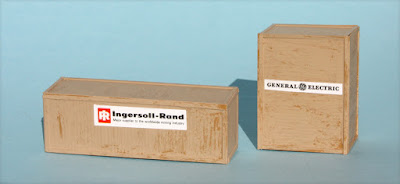I have mentioned the attractions of crates as open-car loads in several previous posts, not only because they are relatively easy to make, but because they can be built so as to be used on both flat cars and gondolas. In addition, they can carry quite varied signs indicating manufacturer. Examples of my crate loads were shown in the preceding post on this topic (see that post at: https://modelingthesp.blogspot.com/2012/03/open-car-loads-crates-and-machinery.html ).
Other examples have also been shown previously, such as Richard Hendrickson’s load of multiple crates on a flat car, which I showed in an earlier post (you can find it here: https://modelingthesp.blogspot.com/2015/09/more-richard-hendrickson-open-car-loads.html ). I wanted to add more such loads.
I decided I would especially like to build some big crates. Such loads need to be large in at least one dimension, so it is evident they cannot be shipped in box cars, but require an open-top car. I began with a long crate, about 24 scale feet long, usable with either a flat car or gondola. The starting point was scribed styrene sheet, 0.040-inch thick, built into a box with a few internal corners braced with 1/8-inch square styrene.
I then used scale 1 x 6-inch styrene strip to secure corners and to hide the edges of joined pieces.
A second crate was also built, with the idea for it to serve as a load on depressed-center flat cars. Logically this should be too tall for a regular flat car or gondola (but be aware of your NMRA track gauge, and don’t exceed operable height). The box was built the same way as the preceding one. Both boxes were then painted a light wood color, Tamiya “Wooden Deck Tan,” no. XF-78.
You may notice that I did not meticulously fit every joint in the corner strips. These are crates, not cabinet work. My good friend C.J. Riley once told me of how he had been admonished by a lead carpenter when he was doing apprentice work, taking too many blows to drive a nail: he was told, “C’mon, Riley, hit the nail! This ain’t no gran’ pye-anna.”
Next I needed to add some signs to the crates. Among the great sources of appropriate names and logos, often with color accents, are period magazines. These might include popular magazines, but a more promising source are technical and engineering journals. Nowadays you can photograph desirable ads in such publications with a cell phone at the library, size them to your needs in Photoshop or comparable software, and print them out on a high-resolution laser printer. Or of course hunt on the Internet.
Among other things, this is a chance to add recognizable elements to your layout, by using the names and emblems of familiar, large corporations. These can range from Ford to Westinghouse to Caterpillar to DuPont. You will see below that I’ve done exactly that. And don’t neglect your on-layout industries, which might ship out some product in a large crate or crates.
Below you see one side of each crate. Here I’ve made an outbound shipment from my on-layout industry, Jupiter Pump and Compressor, with a sign that reads “More Pumps From Jupiter...” while the other crate identifies itself as Mesta Machine Company (for background information on that company, see my post at: https://modelingthesp.blogspot.com/2020/06/blocking-for-big-loads.html). You can click on the image to enlarge it if you wish.
The other side of both crates shows well-known national companies, in line with my comment above. I might add that styrene painted to look like wood only sort of resembles wood, but since these are loads, not primary models, I found the look acceptable.
You might wonder why the long, low load box has its signs so high on the box. The reason is simple: it’s because I want to use this load in gondolas as well as on flat cars, and I want the sign visible:
I like both making and operating loads for open-top cars, so this small project was fun to do, and will be fun when the loads show up in operating sessions. More on crates in a later post.
Tony Thompson





“You’re not building a grand piano, just the box it goes in”
ReplyDelete